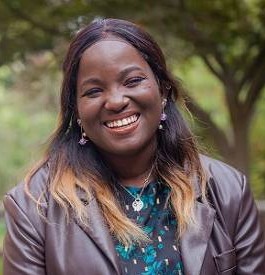Tyra Amofah-Akardom, tea31@cam.ac.uk
United States
Faculty of Education, Fitzwilliam College
PhD thesis: Disorientation and Reimagining Through Community: Black Women’s Activism at ‘Elite’ British and
American Universities
Research interests:
1. Black feminism and intersectionality
2. Racism and anti-racism
3. Aesthetics of activism and resistance
4. Higher education
My doctoral research invokes storytelling as a conceptual backdrop to explore Black feminist activism and community building at two ‘elite’ universities; one in the United States and one in the United Kingdom. Employing a constellation of creative qualitative methods, I investigate the ways that Black women within these institutions embody resistance along racialised, gendered, sexualised and classed lines, by utilising rage, love, and pleasure as political tools. The themes and dilemmas at the heart of my project are not restricted to universities, however, I choose universities as my site of study, understanding that universities act both as a microcosm of society and institutions heavily influenced by wider global transnational issues. Therefore, universities become a particular lens through which to explore the many violences faced by Black women and more crucially, Black women’s embodiment of resistance as expressed in our actions, aesthetics and relationships.
Who or what inspired you to pursue your research interests?
I was inspired to pursue my research interests for multiple reasons. First, to further investigate the critical social and political questions that have arisen for me as a result of my undergraduate and master’s study here at Cambridge. Second, I have been inspired by the amazing women I have met during my time in community spaces at university. These women have – and continue to – teach me the most important lessons. They very much embody the politics of care, and I am very lucky to call many of them good friends.

